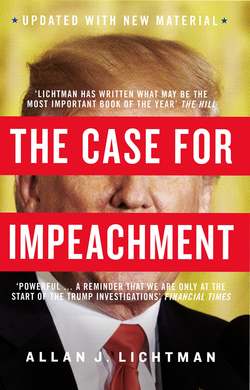Читать книгу The Case for Impeachment - - Страница 25
THE ‘UNWRITTEN’ ARTICLES OF IMPEACHMENT: TREASON AND A CRIME AGAINST HUMANITY
ОглавлениеThe House Judiciary Committee, caught up in the events of Watergate and lacking full information, did not impeach Nixon for arguably his two most serious crimes: treason and a crime against humanity. During his campaign for the presidency in 1968, Nixon claimed that he had a “secret plan” to end the War in Vietnam. But like Trump’s secret plan to defeat ISIS that he promoted in 2016, Nixon’s plan was political rhetoric lacking in substance. What Nixon really feared was a peace deal before Election Day that would steal his thunder and snatch away his last chance for political redemption. Defeat was not an option, and in preemptive response, Nixon illegally meddled in the peace process as a still-private citizen, thereby committing a serious and impeachable offense.
Although peace in Vietnam may have been a long shot, Nixon had tried to sabotage negotiations, putting at risk for his own political ends the lives of many thousands of Americans and Asians. Nixon pressured the South Vietnamese government to stall the peace process and await a better deal under his presidency. Historian John A. Farrell said that Nixon’s “apparently criminal behavior” during the campaign “may be more reprehensible than anything Nixon did in Watergate,” because of “the human lives at stake and the decade of carnage that followed in Southeast Asia.”20
President Lyndon B. Johnson, who had wiretapped Nixon’s telephone, knew of Nixon’s traitorous conduct. He overheard Nixon declare that “we’re going to say to Hanoi, ‘I [Nixon] can make a better deal than he [Johnson] has, because I’m fresh and new, and I don’t have to demand as much as he does in the light of past positions.’ ”In a conversation with Republican Senate Minority Leader Everett Dirksen, Johnson said, “This is treason … that they’re contacting a foreign power in the middle of a war.”21 Nixon had at worst committed treason and at best violated federal law. The Logan Act of 1799 forbids unauthorized citizens from contacting “any foreign government or any officer or agent thereof with intent to influence the measures or conduct of any foreign government.” Violation of the law is a felony, punishable by fines and imprisonment. For the first time since the Nixon era, talk of possible treason and violations of the obscure Logan Act have arisen again with new revelations of contacts between members of the Trump team and Russian officials.22
The Judiciary Committee passed over another potential article charging Nixon with his worst offense, a “crime against humanity” for his illegal, secret war in Cambodia. The concept of a crime against humanity originated during the Nuremberg War trials of Nazi leaders in 1945–1946. As opposed to a specific war crime like torture, a crime against humanity is generally regarded as a widespread or systematic attack directed against any civilian population or an identifiable part of a population, with no exemption for heads of state. Nixon’s covert bombing of Cambodia falls within that rubric.23
In 1965, the violence of America’s war in Vietnam spilled into neighboring Cambodia when President Johnson began a secret but limited bombing campaign against sanctuaries in Cambodia for the Army of North Vietnam and the Communist Vietcong guerillas. President Nixon escalated the raids into an intense carpet-bombing of Cambodia over four years. “There is no limitation on mileage and there is no limitation on budget,” he said. The U.S. dropped a greater tonnage of TNT on this small nation than on all its enemies during World War II.24
The carpet-bombing that devastated Cambodia did nothing to help the American war effort, but it killed some 50,000 to 150,000 civilians, and tragically pushed many young men and women into the camp of the Khmer Rouge Communist guerrillas led by the French-educated Pol Pot. During its brief reign from 1975 to 1979, the Khmer Rouge directly or indirectly killed some 1.5 million Cambodians in a population of just 8 million.25
Nixon’s bombing of Cambodia was illegal in both its conception and execution. He lacked authorization from Congress to bomb Cambodia and kept the operation secret, covering it up with lies. “It’s the best kept secret of the war!” Nixon told Senate hawk John Stennis of Mississippi in April 1970. Days later, Nixon lied to the American people at a press conference, saying that U.S. policy “has been to scrupulously respect the neutrality of the Cambodian people.” Once the bombing became public, Nixon draped himself in the justification of “national security,” even though he had earlier admitted that the cumulative impact of all his bombings in Southeast Asia was “zilch.”26
One of the most consequential questions facing the Trump presidency is whether he will commit a crime against humanity by exacerbating climate change, and posing an existential threat to humanity. In 2016, the International Criminal Court announced that it would expand its focus to “crimes against the environment,” which would include catastrophic climate change.27
